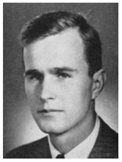The Family (86 page)

Fighting back tears, the father again sprang to his son’s defense. “Should we be loathed for freeing Afghanistan? Or for taking action against a ruthless dictator who has gassed his own people and wants to acquire more deadly weapons? I know this president better than the bishop. He is a man of faith himself.”
The President’s father was right: W. was a man of faith, and that faith inoculated him against doubt. With absolute certainty that he was right, he announced on March 19, 2003, that he had started the war in Iraq with air strikes designed to kill Saddam and his two sons. Barbara Bush told Diane Sawyer on
Good Morning America
that she would not watch the war coverage on television because “90 percent” of it would be speculative. “Why should we hear about body bags and deaths and how many, what day it’s gonna happen? It’s not relevant. So why should I waste my beautiful mind on something like that?”
In addition to the United States, which sent 138,000 troops, the only countries making substantial military contributions to the war were Britain—45,000 military personnel—and Australia. Yet the State Department claimed to have forty-nine countries in its “coalition of the willing.” When cable television’s
The Daily Show
discovered that Morocco’s contribution was two hundred monkeys enlisted to set off land mines, the satiric program called it the “coalition of the piddling.” Other “coalition” partners, from Latvia to Panama to Uzbekistan, offered only statements of support.
The military conquest seemed simple and inevitable, which at that stage it was. Ground forces entered Iraq from Kuwait, followed by screeching air raids and relentless bombing. In less than a month, U.S. forces were toppling Saddam’s statues throughout Baghdad as the city fell and looting broke out.
The biggest decision then facing the White House was how to feature the President claiming victory. His image makers considered putting him before a joint session of Congress or leading a ticker-tape parade through New York City. Finally they devised a dramatic scenario that would make him look more commanding than General George Patton. Their visual of Alamo macho far surpassed even Hollywood’s most extravagant
Top Gun
fantasy.
In a snug-fitting olive green flight suit, the President was to take the controls of a Navy S-3B Viking jet on May 1, 2003, and make a tail-hook landing on the USS
Abraham Lincoln
in the Pacific Ocean as the aircraft carrier steamed toward San Diego. According to the orchestrated plan, George W. bounded off the jet like a heroic sky jockey, his helmet tucked under his arm; he strutted along the flight deck, posing for pictures and shaking hands with the crew. He was led to a captain’s chair to watch a dazzling air show as thirty-six F-18s of the Naval Carrier Air Wing headed home from duty to their base near Fresno. Three squadrons of Hornets hurtled into the air with a deafening roar; twelve of the jets reappeared in a V formation to fly over the ship in a formal farewell. Then, like Superman, the President disappeared belowdecks to change clothes. He returned in a business suit with an American flag pinned to his lapel and mounted a podium that displayed the presidential seal. Standing under a great banner proclaiming “Mission Accomplished,” he announced to five thousand cheering sailors the “end of major combat operations” in Iraq.
With that virtuoso visual, the President of the United States began playing the political equivalent of Texas Hold ’Em poker, a high-stakes game in which the winner takes all. For the next six months, he would gamble his reelection and the continuation of the Bush dynasty on his war, which he saw as visionary and courageous, against those who saw it as reckless and tragic. He was betting on capturing Osama bin Laden and finding weapons of mass destruction in Iraq. He was wagering everything against the mounting death tolls and the scandals of horrific prisoner abuse by U.S. troops. He had calculated the odds that Americans would not desert a President during wartime, even a war that was going to cost at least $200 billion and throw the country into a deficit of more than half a trillion dollars by the end of 2004.
It was a staggering gamble, but the President had no doubts that he would win. His ace in the hole was the House of Bush, which would do anything to ensure his victory and continue the family dynasty. George W. Bush acted like a man who had stacked the deck.
He was so driven to win on Iraq that he would not tolerate dissent. When other heads of state expressed disagreement with his invasion, he treated them like miscreants who deserved to be punished.
When German Chancellor Gerhard Schröder was reelected by opposing the U.S.-led invasion, Bush was incensed, partially because Schröder’s Minister of Justice had compared his pressure tactics on Iraq to those of Adolf Hitler. The Justice Minister resigned the day after Schröder’s narrow reelection, but Bush refused to pick up the phone and make the customary call of presidential congratulations.
When Mexican President Vicente Fox opposed the U.S. stand on Iraq in the UN Security Council, he, too, got the treatment. “There will be a certain sense of discipline,” Bush warned. It sounded like the Mexican President might end up sleeping with the fishes. W. wheeled on Fox, formerly a close friend who had spent time with the Bushes at their ranch in Crawford and had been honored with the first White House state dinner of the Bush presidency. But all of that was forgotten when Fox said that Mexico could not accept Bush’s resolution for regime change in Iraq because it would set a precedent that could justify U.S. invasions in any country in the world. Bush stopped speaking to his friend Vicente Fox and made him wait four days before he deigned to return his phone call. Bush’s discourtesy to Mexico, the second-largest U.S. trading partner, was personal, petulant, and diplomatically destructive.
Bush canceled a state visit to Canada to show his displeasure with Prime Minister Jean Chrétien’s stand against the war, and he turned his back on France when French President Jacques Chirac had opposed him. There was no U.S. participation in the Paris Air Show. The Members’ Dining Room in the House of Representatives renamed French fries and started serving Freedom fries. On Air Force One, it was au revoir to French toast and good morning to Freedom toast. President Bush said it was not clear to him that France cared whether U.S. citizens lived in safety and security. With those words, he started an American boycott of all things French.
The bullyboy who played pig ball at Andover had learned to reward his friends and punish his enemies. If you cannot win on merit, you win on might and muscle, but you win—at any price. “Victory,” in the words of his hero Winston Churchill, “at all costs, victory in spite of all terror; victory, however long and hard the road may be; for without victory there is no survival.”
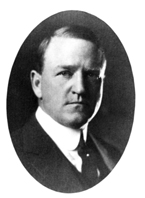
George Herbert Walker (1874–1953), known as Bert, was the father of Dorothy Walker, the grandfather of George Herbert Walker Bush, forty-first President, and the great-grandfather of George Walker Bush, forty-third President. In 1900, Bert Walker founded G. H. Walker and Company, the source of the family’s wealth.
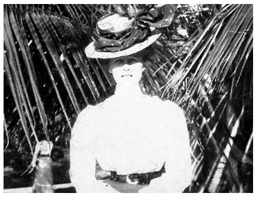
Lucretia “Loulie” Wear Walker (1874–1961) in Palm Beach, Florida, early 1900s. When the devoutly religious Presbyterian married Bert Walker in 1899, his Roman Catholic father, D. D. Walker, refused to attend the wedding. Loulie, who did not like the name Lucretia, was the mother of Dorothy Walker Bush.
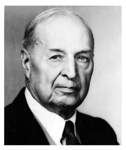
Samuel Prescott Bush (1863–1948), a year before he died. He graduated from Stevens Institute of Technology in Hoboken, New Jersey, in 1884, with a degree in engineering. Later he moved to Columbus, Ohio and became president of the Buckeye Steel Castings Company (1905–27). He married Flora Sheldon and had five children: Prescott, Robert, Mary, Margaret, and James.
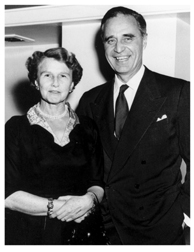
Dorothy Walker Bush and Prescott Sheldon Bush (1895–1972). They married on August 6, 1921, four years after Prescott graduated from Yale. They had five children, Prescott Sheldon junior, George Herbert Walker, Nancy, Jonathan James, and William Henry Trotter, and lived in Greenwich, Connecticut, where Prescott became moderator of the Representative Town Meeting in 1935. He ran for the U.S. Senate in 1950, was elected in 1952, and served until January 1963, when he retired.
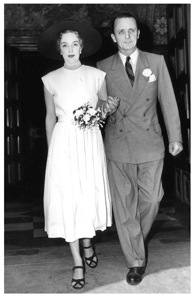
James S. Bush (1901–78) and his new bride, Janet Rhinelander Stewart (he was her third husband; she was his second wife), leaving Christ Methodist Church in New York City after their wedding in 1948. The marriage lasted four years. Janet, listed among the ten best-dressed women in the world, was the daughter of Fleming Newbold, president of the
Washington Star.
Jim Bush left his first wife, Caroline Patterson of the National Cash Register family, to marry Stewart. His older brother, Prescott, did not speak to him for several years. Jim Bush, the family black sheep, would marry twice again before his mysterious death in the Philippines.
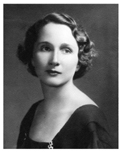
Pauline Robinson Pierce (1896–1949), mother of Barbara Bush, married Marvin Pierce following their graduation from Miami University in Ohio. A great beauty, she lived above her means, which forced her husband to go into debt to support her lifestyle. She died in a car accident. Her husband remarried. Barbara Bush, who did not attend her mother’s funeral, named her first daughter Robin, after Pauline Robinson.
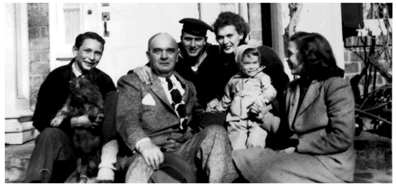
Marvin Pierce and family in Rye, New York, circa World War II. Left to right: Scott (b. 1930); Marvin; Jim (1922–93); Martha Pierce Rafferty (1920–99) with her daughter, Sharon Rafferty; and Barbara Pierce (b. 1925). Marvin (1893–1969) was born in Sharpsville, Pennsylvania. He was a star athlete in college and received graduate degrees from MIT in civil engineering and from Harvard in architectural engineering. He was president of McCall Corporation from 1946 to 1958.
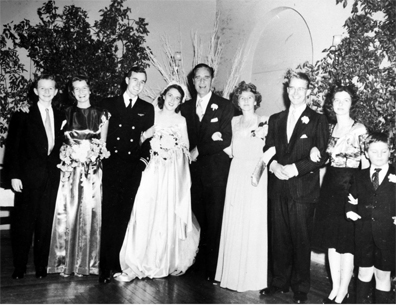
The wedding of George Herbert Walker “Poppy” Bush and Barbara “Bar” Pierce in Rye, New York, on January 6, 1945. From left: Jonathan Bush, Nancy Bush, George (home from the Navy), Barbara, Prescott, Dorothy, Prescott junior, and his wife, Elizabeth, and William Henry Trotter Bush, known as Bucky. Barbara, who said she married the first man who kissed her, became closer to his family than she was to her own.
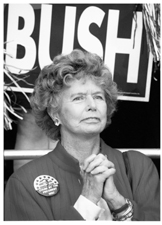
Nancy Bush Ellis, George H.W. Bush’s only sister, born in 1926. She graduated from Vassar, class of 1946, and married Alexander “Sandy” Ellis Jr. (Yale 1944). She was a liberal Democrat and had an affair with the Kennedy historian Arthur Schlesinger Jr. Ellis was active in raising money for the NAACP. When her brother ran for President in 1988, she became a Republican to vote for him.
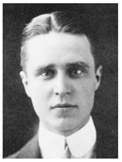
Prescott S. Bush (class of 1917), known as Pres or Doc, prepped at St. George’s School in Newport, Rhode Island. At six feet four, he was figuratively and literally a big man on campus at Yale. He played sports, lettering in golf and baseball, sang with the Whiffenpoofs, and joined Skull and Bones, leaving an illustrious record that paved the way for his sons. He served on the Yale Corporation and remained involved with Yale throughout his life.
